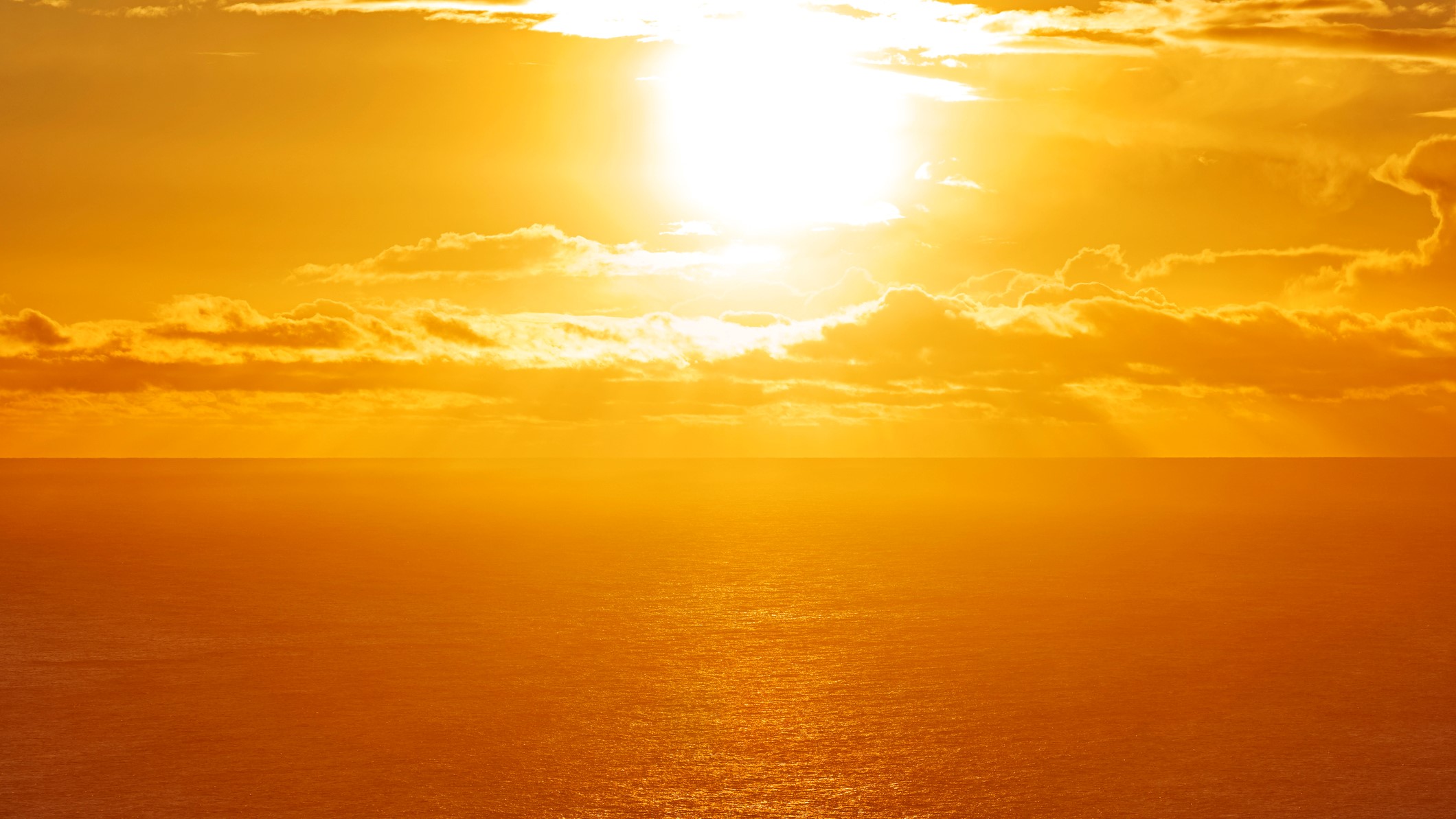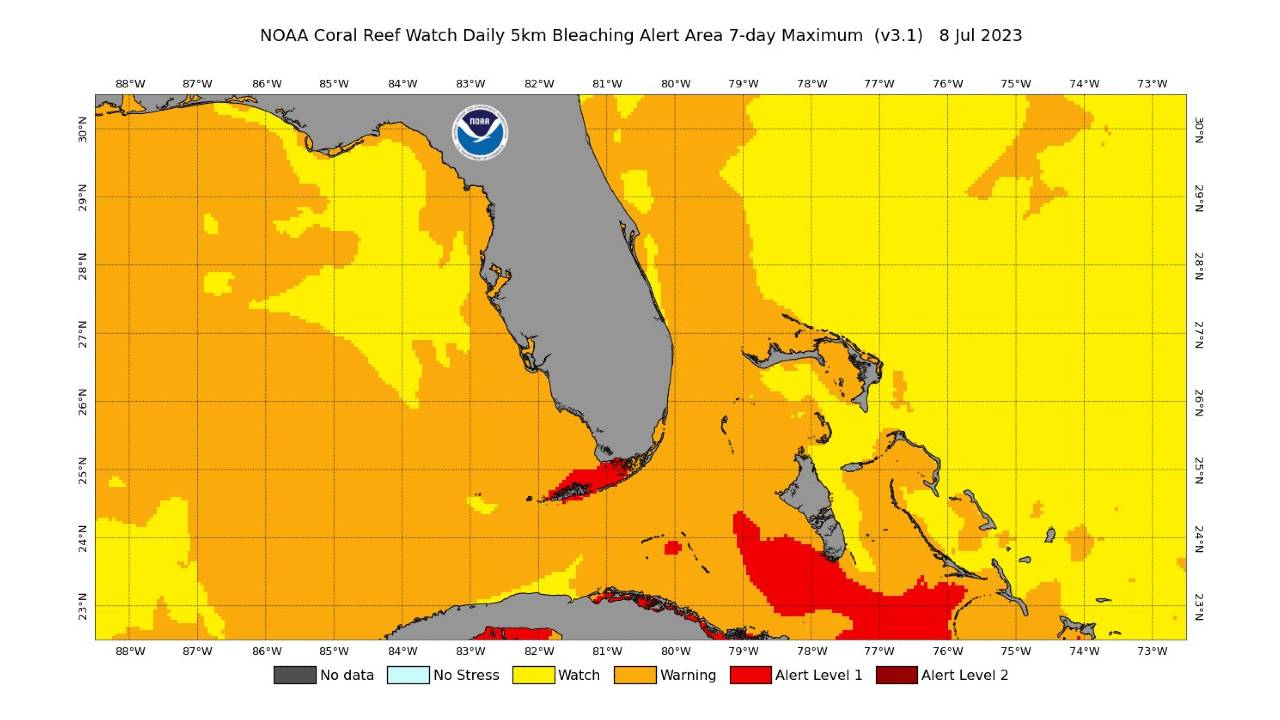Florida waters now 'bona fide bathtub conditions' as heat dome engulfs state
The unprecedented water temperatures — reaching up to 95 degrees Fahrenheit in some places — could intensify storms and hurricanes in the Sunshine State.
Coastal waters around Florida have reached alarming temperatures of 95 degrees Fahrenheit (35 degrees Celsius) with no sign of cooling off anytime soon, experts say.
The Sunshine State is in the midst of its hottest year in modern history, with temperatures over land averaging in the mid 90s F (35 C) — 3 to 5 F (1.7 to 2.8 C) above normal for this time of year. Ocean waters have absorbed much of this heat, causing sea temperatures to soar to record highs, which could spell trouble for marine ecosystems and strengthen storms and hurricanes.
"It's an astounding, prolonged heat wave even for a place that's no stranger to sultry weather," Brian McNoldy, a senior research associate at the University of Miami's School of Marine, Atmospheric, and Earth Science, told the Washington Post. "It's not something we like to see near land simply because it would allow a storm to maintain a high intensity right up to landfall or rapidly intensify as it approaches landfall."
Related: Heat waves are hitting the deep ocean floor, with potentially catastrophic results
The marine heat wave has hit at a time when the water is already warm, "bringing it up to bona fide bathtub conditions that we rarely see," he added.
Waters off Florida typically reach temperatures in the high 80s F (31 C) in July, said Jeff Berardelli, chief meteorologist and climate specialist at the television station WFLA-TV in Tampa. But temperatures this year are "boiling," he wrote on Twitter on Monday (July 10).
A severe marine heatwave has emerged off the coast of Florida as water temperatures have soared into the 90s. Multiple buoys in Everglades National Park are reporting water temperatures as high as 95°F (35°C). pic.twitter.com/ovgd56WFkIJuly 9, 2023
The current bath-like conditions are consistent with a "severe" marine heat wave, according to the National Oceanic and Atmospheric Administration (NOAA). The agency defines marine heat waves as "prolonged periods of anomalously high sea surface temperature" that can impact "a broad range of marine life."
Get the world’s most fascinating discoveries delivered straight to your inbox.
This includes coral bleaching, as reefs are "extremely sensitive to slight changes (just a few degrees) in water [temperature]," Berardelli wrote. NOAA's Coral Reef Watch has designted an "Alert Level 1" area off the coast of Florida — the second-highest warning on the scale — with "significant bleaching likely."
The spike in ocean heat in Florida is partly attributable to unusually warm waters in the Gulf of Mexico and to record-breaking sea surface temperatures worldwide. "Very, very light" and "inconsistent" winds over the state have also played a role, Berardelli noted.
"We have a very off weather pattern this summer, and sea surface [temperatures] respond to that," he wrote. While "a nice breeze" typically sweeps over Florida from the southeast this time of year, the state has seen near-windless conditions — and when there is wind, it has brought warmer air from the Gulf of Mexico in the west, Berardelli added.
These conditions mean there has been little to no mixing of the sun-exposed top layer of water with colder waters below.
Another factor contributing to the marine heat wave could be low rainfall over the Floridian peninsula, which usually acts to cool the ocean surface, Berardelli wrote.
The unprecedented water temperatures are intensifying the heat wave on land, which is predicted to rage on for at least another week. Increased ocean warmth raises humidity and keeps air temperatures high during the night. As a result, the state has recorded heat indexes — which factor in humidity to measure how hot the air feels — topping 110 F (43 C).
In June, NOAA reported that 40% of the world's oceans were facing marine heat waves, and this record-breaking percentage is predicted to increase to 50% by September. The effects are tied to climate change compounded by an ongoing El Niño event, with oceans absorbing 90% of the extra heat in the climate system.

Sascha is a U.K.-based staff writer at Live Science. She holds a bachelor’s degree in biology from the University of Southampton in England and a master’s degree in science communication from Imperial College London. Her work has appeared in The Guardian and the health website Zoe. Besides writing, she enjoys playing tennis, bread-making and browsing second-hand shops for hidden gems.
 Live Science Plus
Live Science Plus







